2021年中考英语语法复习——不定代词语法基本知识
文档属性
| 名称 | 2021年中考英语语法复习——不定代词语法基本知识 | 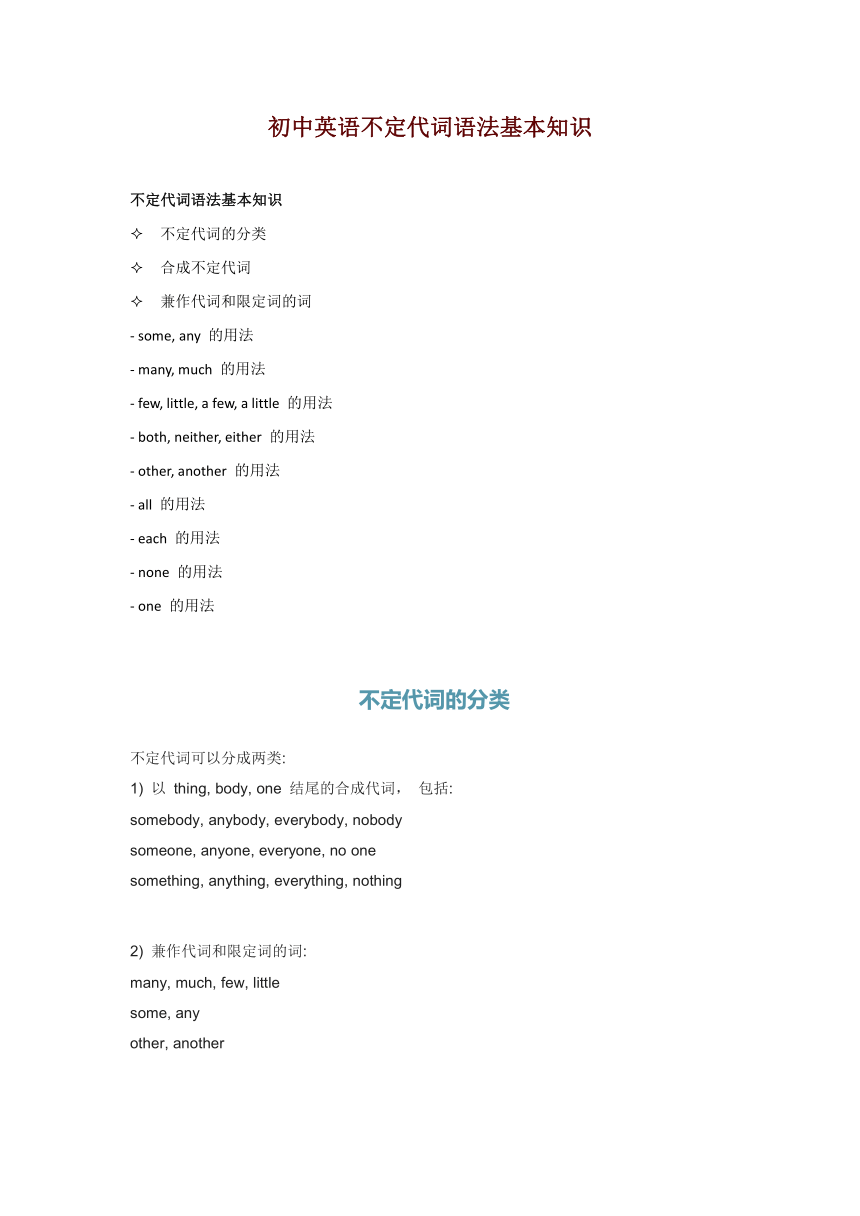 | |
| 格式 | doc | ||
| 文件大小 | 36.0KB | ||
| 资源类型 | 教案 | ||
| 版本资源 | 人教新目标(Go for it)版 | ||
| 科目 | 英语 | ||
| 更新时间 | 2021-04-29 11:26:29 | ||
图片预览

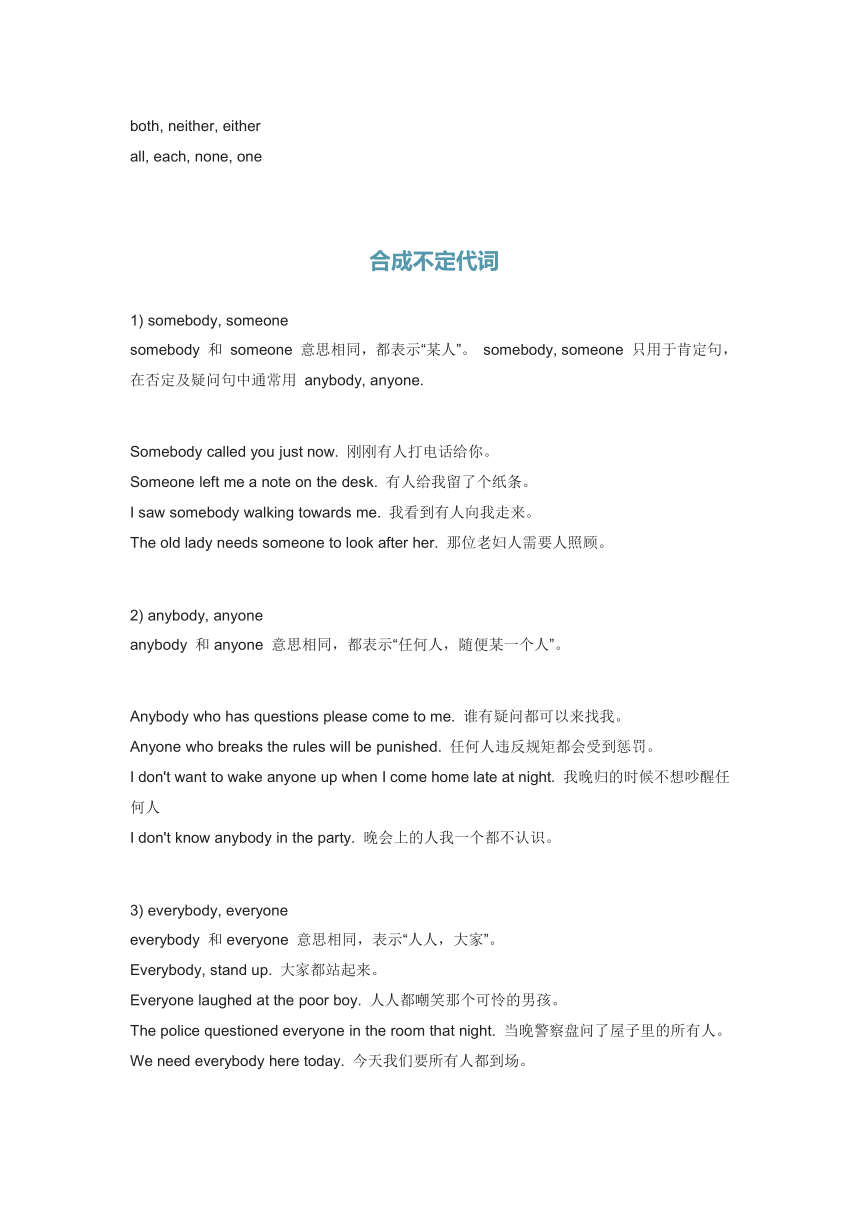
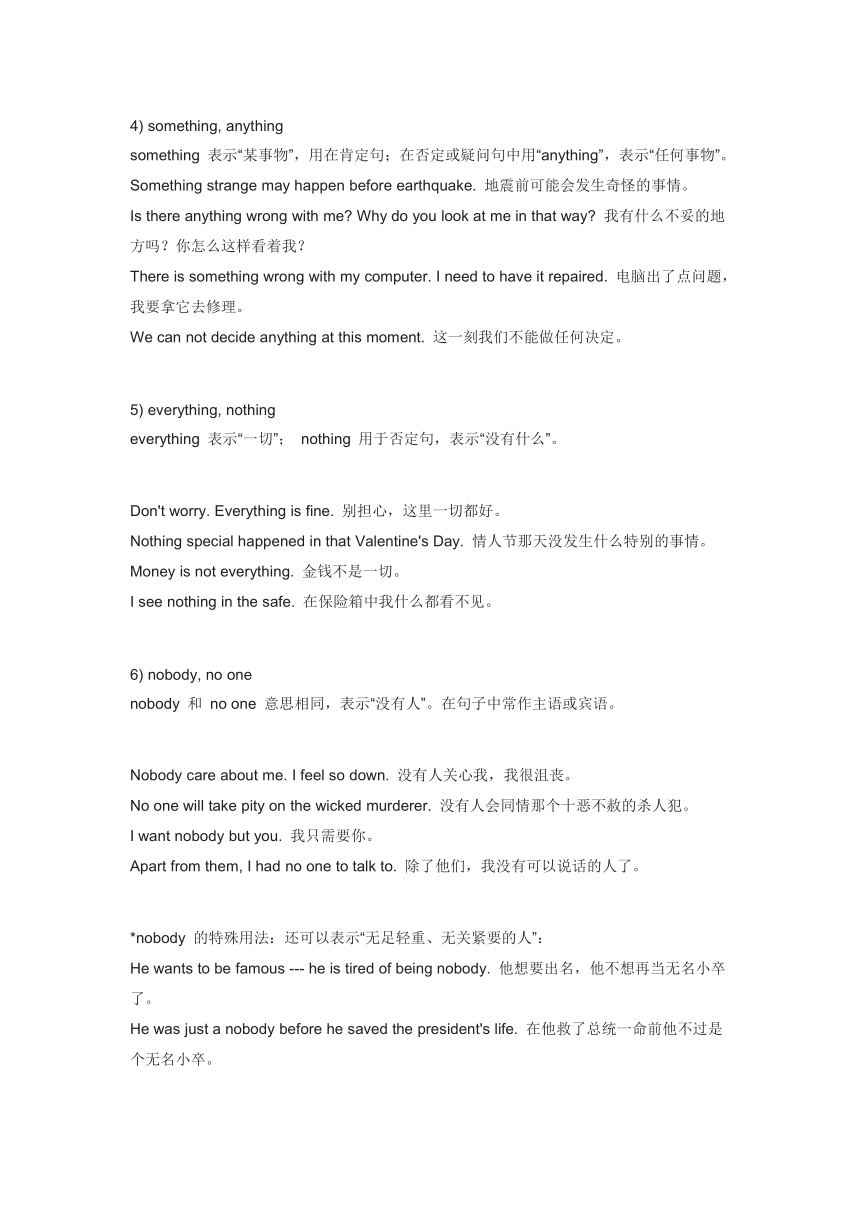
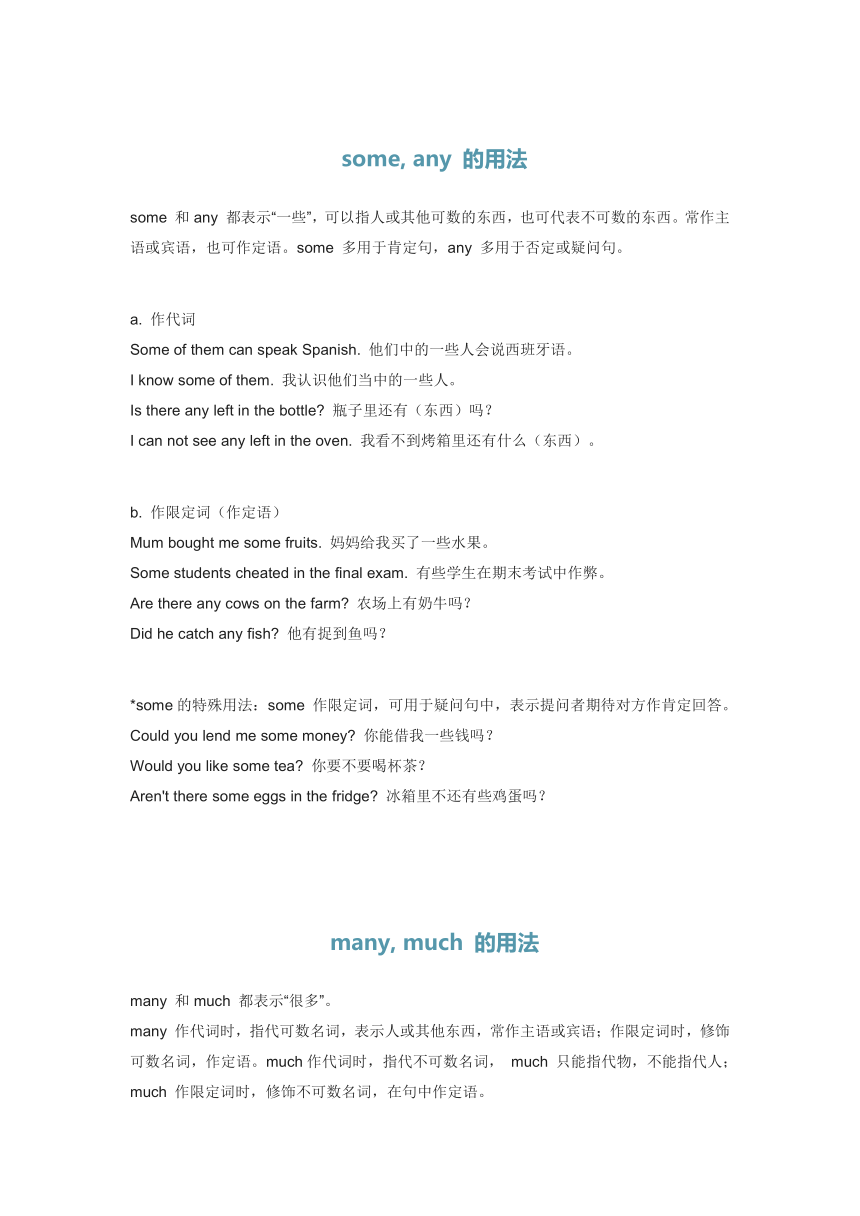
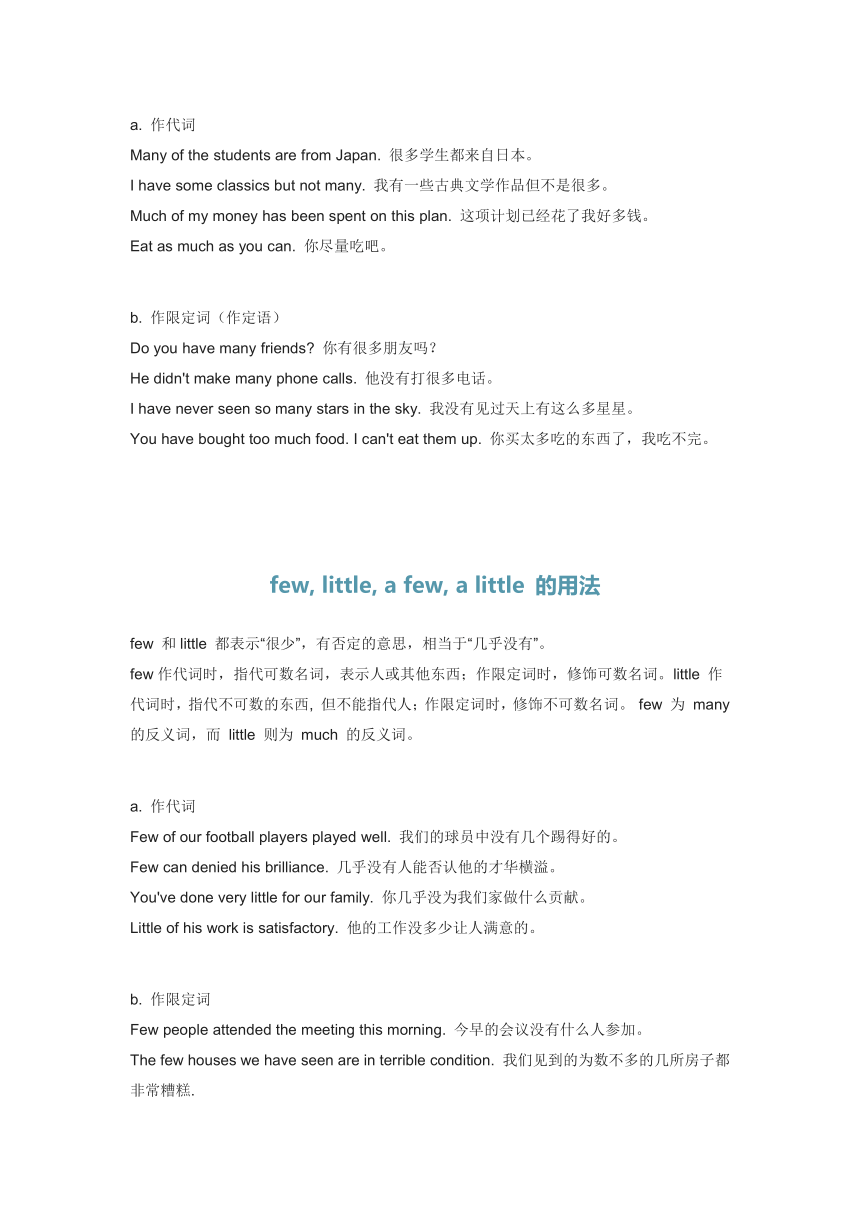
文档简介
初中英语不定代词语法基本知识
不定代词语法基本知识
不定代词的分类
合成不定代词
兼作代词和限定词的词
- some, any 的用法
- many, much 的用法
- few, little, a few, a little 的用法
- both, neither, either 的用法
- other, another 的用法
- all 的用法
- each 的用法
- none 的用法
- one 的用法
不定代词的分类
不定代词可以分成两类:
1) 以 thing, body, one 结尾的合成代词, 包括:
somebody, anybody, everybody, nobody
someone, anyone, everyone, no one
something, anything, everything, nothing
2) 兼作代词和限定词的词:
many, much, few, little
some, any
other, another
both, neither, either
all, each, none, one
合成不定代词
1) somebody, someone
somebody 和 someone 意思相同,都表示“某人”。 somebody, someone 只用于肯定句,在否定及疑问句中通常用 anybody, anyone.
Somebody called you just now. 刚刚有人打电话给你。
Someone left me a note on the desk. 有人给我留了个纸条。
I saw somebody walking towards me. 我看到有人向我走来。
The old lady needs someone to look after her. 那位老妇人需要人照顾。
2) anybody, anyone
anybody 和anyone 意思相同,都表示“任何人,随便某一个人”。
Anybody who has questions please come to me. 谁有疑问都可以来找我。
Anyone who breaks the rules will be punished. 任何人违反规矩都会受到惩罚。
I don't want to wake anyone up when I come home late at night. 我晚归的时候不想吵醒任何人
I don't know anybody in the party. 晚会上的人我一个都不认识。
3) everybody, everyone
everybody 和everyone 意思相同,表示“人人,大家”。
Everybody, stand up. 大家都站起来。
Everyone laughed at the poor boy. 人人都嘲笑那个可怜的男孩。
The police questioned everyone in the room that night. 当晚警察盘问了屋子里的所有人。
We need everybody here today. 今天我们要所有人都到场。
4) something, anything
something 表示“某事物”,用在肯定句;在否定或疑问句中用“anything”,表示“任何事物”。
Something strange may happen before earthquake. 地震前可能会发生奇怪的事情。
Is there anything wrong with me? Why do you look at me in that way? 我有什么不妥的地方吗?你怎么这样看着我?
There is something wrong with my computer. I need to have it repaired. 电脑出了点问题,我要拿它去修理。
We can not decide anything at this moment. 这一刻我们不能做任何决定。
5) everything, nothing
everything 表示“一切”; nothing 用于否定句,表示“没有什么”。
Don't worry. Everything is fine. 别担心,这里一切都好。
Nothing special happened in that Valentine's Day. 情人节那天没发生什么特别的事情。
Money is not everything. 金钱不是一切。
I see nothing in the safe. 在保险箱中我什么都看不见。
6) nobody, no one
nobody 和 no one 意思相同,表示“没有人”。在句子中常作主语或宾语。
Nobody care about me. I feel so down. 没有人关心我,我很沮丧。
No one will take pity on the wicked murderer. 没有人会同情那个十恶不赦的杀人犯。
I want nobody but you. 我只需要你。
Apart from them, I had no one to talk to. 除了他们,我没有可以说话的人了。
*nobody 的特殊用法:还可以表示“无足轻重、无关紧要的人”:
He wants to be famous --- he is tired of being nobody. 他想要出名,他不想再当无名小卒了。
He was just a nobody before he saved the president's life. 在他救了总统一命前他不过是个无名小卒。
some, any 的用法
some 和any 都表示“一些”,可以指人或其他可数的东西,也可代表不可数的东西。常作主语或宾语,也可作定语。some 多用于肯定句,any 多用于否定或疑问句。
a. 作代词
Some of them can speak Spanish. 他们中的一些人会说西班牙语。
I know some of them. 我认识他们当中的一些人。
Is there any left in the bottle? 瓶子里还有(东西)吗?
I can not see any left in the oven. 我看不到烤箱里还有什么(东西)。
b. 作限定词(作定语)
Mum bought me some fruits. 妈妈给我买了一些水果。
Some students cheated in the final exam. 有些学生在期末考试中作弊。
Are there any cows on the farm? 农场上有奶牛吗?
Did he catch any fish? 他有捉到鱼吗?
*some的特殊用法:some 作限定词,可用于疑问句中,表示提问者期待对方作肯定回答。
Could you lend me some money? 你能借我一些钱吗?
Would you like some tea? 你要不要喝杯茶?
Aren't there some eggs in the fridge? 冰箱里不还有些鸡蛋吗?
many, much 的用法
many 和much 都表示“很多”。
many 作代词时,指代可数名词,表示人或其他东西,常作主语或宾语;作限定词时,修饰可数名词,作定语。much作代词时,指代不可数名词, much 只能指代物,不能指代人;much 作限定词时,修饰不可数名词,在句中作定语。
a. 作代词
Many of the students are from Japan. 很多学生都来自日本。
I have some classics but not many. 我有一些古典文学作品但不是很多。
Much of my money has been spent on this plan. 这项计划已经花了我好多钱。
Eat as much as you can. 你尽量吃吧。
b. 作限定词(作定语)
Do you have many friends? 你有很多朋友吗?
He didn't make many phone calls. 他没有打很多电话。
I have never seen so many stars in the sky. 我没有见过天上有这么多星星。
You have bought too much food. I can't eat them up. 你买太多吃的东西了,我吃不完。
few, little, a few, a little 的用法
few 和little 都表示“很少”,有否定的意思,相当于“几乎没有”。
few作代词时,指代可数名词,表示人或其他东西;作限定词时,修饰可数名词。little 作代词时,指代不可数的东西, 但不能指代人;作限定词时,修饰不可数名词。 few 为 many 的反义词,而 little 则为 much 的反义词。
a. 作代词
Few of our football players played well. 我们的球员中没有几个踢得好的。
Few can denied his brilliance. 几乎没有人能否认他的才华横溢。
You've done very little for our family. 你几乎没为我们家做什么贡献。
Little of his work is satisfactory. 他的工作没多少让人满意的。
b. 作限定词
Few people attended the meeting this morning. 今早的会议没有什么人参加。
The few houses we have seen are in terrible condition. 我们见到的为数不多的几所房子都非常糟糕.
We had little rain all summer. 一夏天几乎没下雨。
There's little point in telling her the truth now. 现在告诉她真相已没什么意义。
a few 表示“有几个,有一些”,a little 表示“有一点儿”,两者都有肯定的意思。
a few作代词时,指代可数名词,表示人或其他东西;作限定词时,修饰可数名词,作定语。a little 作代词时,代表不可数的东西,但不能代表人;作限定词时,修饰不可数名词,作定语。
a. 作代词
Only a few of the applicants are suitable for this job. 只有少数申请者适合做这份工作。
I met a few of my friends in this bar. 我在这家酒吧里和几个朋友碰面。
Try and eat a little. 试着吃一点儿吧。
Tell me a little about his illness. 告诉我一点他的病情。
b. 作限定词(作定语)
I only have a few pennies with me. 我身上只有几便士。
He asked me a few questions about psychology. 他问了我几个关于心理学的问题。
Let's have a little wine before sleep. 让我们睡前喝一点儿酒吧。
Could you give me a little more information about the accident? 你能告诉我多一点关于那场意外的资料吗?
both, neither, either 的用法
1. both 表示“两者都...”,可兼作代词和限定词。作代词时,指代复数可数名词,在句中作主语、宾语或同位语;作限定词时,修饰复数可数名词,作定语。
a. 作代词(作主语、宾语、同位语)
Both of the women are French. 这两个女人都是法国人。(作主语)
Both of my parents live in London. 我父母都住在伦敦。(作主语)
I love both of them. Can you buy them to me? 它们两个我都喜欢。你可以都买下来吗?(作宾语)
We both went to their wedding. 我们两个都参加了他们的婚礼。(作同位语)
b. 作限定词(作定语)
She kissed him on both cheeks. 她亲了他的双颊。
Both these books are expensive. 这两本书都很贵。
He held bottles in both hands. 他两只手都捧着瓶子。
2. either 表示“两者中的任何一个”,可兼作代词和限定词。作代词时,指代单数可数名词,在句中作主语或宾语;作限定词时,修饰单数可数名词,作定语。
a. 作代词
You can keep either of these two forms. 这两张表格你可以保留任意一张。
Either of the plans is equally good. 两个计划一样好。
Either of them is OK. 他们中任何一个都行。
b. 作限定词(定语)
There's a staircase at either end of the corridor. 走廊两端都有楼梯。
He can write with either hand. 他用哪只手写字都成。
There are shops on either side of the street. 街道两旁都有商店。
3. neither 表示“两者都不”,作代词时可用作主语、宾语或同位语。作限定词时用作定语。a. 作代词
Neither of them knew about it. 他们两人并不知道这回事。(作主语)
I tried on two dresses, but neither fits me. 我试了两件套裙,哪一件也不合身。(作主语)
I chose neither of them. 这两个我都不要。(作宾语)
I could answer neither of the questions. 两个问题我都答不上来。(作宾语)
They neither of them wanted to go. 他们两人都不想去。(同位语)
b. 作限定词
Neither boy is to blame. 两个男孩子都不应责怪。
Neither answer is correct. 两个答案都不对。
other, another 的用法
other 在句中可以多种形式出现,这些形式有 other, the other, others, the others等, 它们和 another 的用法区别如下:
1) other 单独使用 (即前没有定冠词the时) 只能作定语。泛指 “其他的(人或物)”。
Mr. Smith, Mrs. Jones and three other teachers were there. 史密斯先生、琼斯太太以及另外三位老师都在那儿。
Besides Titanic, did you see any other films? 除了泰坦尼克号,你还看过其他电影吗?
2) the other 可作代词,也可作定语。由于other前有the, 所以起到特指的作用。 the other 可以指两个中的另一个,而another 则不能这样用。
a. 作代词时,the other特指另外一个人或物。
Tom has two brothers. One is a teacher, and the other is a doctor. 汤姆有两个弟弟,一个是老师,另一个是医生。
There were three apples on the table. He took two of them, and I took the other. 桌上有三个苹果。他拿了两个,我拿了剩下的一个。
b. 作定语时,the other 可修饰单数名词,也可修饰复数名词。修饰单数名词时特指“另外的一个(人或物)”。修饰复数名词时特指“另外的一些(人或物)”。
You may continue writing on the other side of the paper. 你可以在纸的另一面继续写。
Besides Mary and Daisy, the other students in my class are from Italy. 除了玛丽和黛西,我班上的其他同学都是意大利人。
3) others 是other的名词复数形式,泛指”另外几个”, “其余几个”。在句中作主语或宾语。
These shoes don't fit. Have you got any others? 这双鞋子不合穿,你还有别的鞋吗?
Some people came by car; others came on foot. 有的人是坐车来,有的是走路来。
4) the others 是 the other 的复数形式。特指某一范围内的“其他人或物”。在句中作主语或宾语。
I went swimming yesterday while the others played tennis. 我昨天去游泳,其他人去打网球。
A boy fell off his chair and the others laughed. 一个男孩从椅子上摔下来,其他人都笑了。
5) another 既可作代词,也可以作限定词(定语)。 泛指三者或三者以上的 “另一个”, 只能代替或修饰单数可数名词。
a. 作代词
We are changing from one system to another. 我们正在从一种系统向另一种系统转变。
I have another of his books. 我有他的另一本书。
I don't like this apartment; let's see another. 我不喜欢这间公寓,我们再看看另一间吧。
b. 作限定词(定语)
Can I have another glass of water, please? 请问我可以再要一杯水吗?
Peter's mum is expecting another baby in June. 彼得妈妈的预产期将在六月份。
all 的用法
1)all 作定语
a) all 作定语可表示“一切的,所有的,全部的”, 可修饰可数名词或不可数名词。
All people enjoyed themselves that night. 那晚所有人都玩得很尽兴。
All hope has gone. 一切希望都破灭了。
I want to know all the details. 全部情况我都想知道。
b) all 修饰可数复数名词时,名词前可有the, this/that/these/those, my, his, her等,也可有基数词。
All the people you invited are coming. 你所邀请的人全都来。
It is not necessary to do all these exercises. 没必要做所有这些练习。
All my plants have died. 我的花草全都死了。
All five men are hard workers. 他们五个人都很努力。
c) all 可与表示一段时间的单数名词连用,表示 “整个”。
It has been raining all day. 雨下了一整天。
She was abroad all last summer. 她去年整个夏天都在国外。
He has lived all his life in London. 他一生都住在伦敦。
2) all 作代词
a) all 作代词时,可指代可数名词和不可数名词,在句中作主语或宾语。
All of my toys were broken. 我所有的玩具都坏了。
I invited all of my relatives to my wedding party. 我邀请了全部亲戚来参加我的婚礼。
Take all of the wine! 把这些酒全喝光!
All of this is yours. 这些全都是你的。
b) all 也可以作同位语。all 作为主语的同位语时应位于实义动词之前,系动词、助动词或情态动词之后。
I have read them all. 我全都看了。
We all know that we should be punctual. 我们都知道我们必须准时。
You should all hand in your work by tomorrow. 明天你们必须都把作业交上来。
They were all killed in that accident. 他们都在那场意外中丧生了。
each 的用法
each 表示“每一个”,可作代词和限定词。
1. 作代词时,指代单数可数名词,在句中可以作主语、宾语或同位语。
a. 作主语
Each of the students dressed in different colors. 每个学生都穿了不同颜色的衣服。
Each is useful in its degree. 各有程度不同的用处。
b. 作宾语
He gave two apples to each. 他给了每人两个苹果。
I asked all the children and each told a different story. 我问了全部孩子,每人的说法都不同。
Each student was issued with a textbook. 给每个学生发了一本教科书。
c. 作同位语
We each have a different point of view. 我们每个人都有不同观点。
He gave the children a present each. 他给了每个小孩子一份礼物。
2. 作限定词(定语), 修饰单数可数名词。
Each day passed without any news. 一天天过去,音信杳然。
Each lesson lasts an hour. 每节课时间为一小时。
On each side of the road 在路的每一边。
none 的用法
none 表示“没有一个”,作代词时可指代可数或不可数名词,在句中充当主语、宾语或同位语。
a. 作主语
None of my friends left me when I was in trouble. 我有困难的时候没有一个朋友离开我。
None of this money is mine. 这些钱没有一点是我的。
b. 作宾语
I asked for some more cake, but there was none left. 我想再要点蛋糕,却一点都没有了。
He had lost none of his charm for her. 他对她的吸引力一点儿都没少。
c. 作同位语
We none of us lived round here. 我们谁也不住在这附近。
They have none of them finished the task. 他们谁也没完成任务。
one 的用法
one 表示“一个”,可作代词或限定词。作代词时,指代单数可数名词,表示人或其他东西;作限定词时,作定语修饰单数可数名词。
one 作代词时在句中的作用如下:
a) 表示一个人或事物:
It's a present for one of my children. 这是送给我的一个孩子的礼物。
There were three coaches and one was black. 有三名教练, 一个是黑人。
b) 用于代替刚提过的可数的事物:
There are many magazines there. I'll get one for you. 那里有很多杂志,我给你拿一本。
There were three pens and one was black. 有三支笔,其中一只是黑色的。
c) 泛指一般的人或指本人:
One could see that he was very upset. 我们可以看出他很难过。
One gets the impression that they disapprove. 本人的印象是, 他们不赞成。
d) 用于辩别所谈的人或事:
Our house is the one next to the school. 我家的房子就是学校旁边的那座
Students who do well in examinations are the ones who ask questions in class. 考试成绩好的都是上课爱提问的学生。
one 也可作限定词,在句中作定语:
There's one thing that I am sure of. 有一点我是很确定的。
There's only one piece of cake left. 只剩下一块饼了。
One afternoon lily went out with Adam. 一天下午莉莉和亚当一块儿出去了。
One day you will regret that you've done so many wrong things. 有一天你会为自己做了那么多错事而感到后悔。
不定代词语法基本知识
不定代词的分类
合成不定代词
兼作代词和限定词的词
- some, any 的用法
- many, much 的用法
- few, little, a few, a little 的用法
- both, neither, either 的用法
- other, another 的用法
- all 的用法
- each 的用法
- none 的用法
- one 的用法
不定代词的分类
不定代词可以分成两类:
1) 以 thing, body, one 结尾的合成代词, 包括:
somebody, anybody, everybody, nobody
someone, anyone, everyone, no one
something, anything, everything, nothing
2) 兼作代词和限定词的词:
many, much, few, little
some, any
other, another
both, neither, either
all, each, none, one
合成不定代词
1) somebody, someone
somebody 和 someone 意思相同,都表示“某人”。 somebody, someone 只用于肯定句,在否定及疑问句中通常用 anybody, anyone.
Somebody called you just now. 刚刚有人打电话给你。
Someone left me a note on the desk. 有人给我留了个纸条。
I saw somebody walking towards me. 我看到有人向我走来。
The old lady needs someone to look after her. 那位老妇人需要人照顾。
2) anybody, anyone
anybody 和anyone 意思相同,都表示“任何人,随便某一个人”。
Anybody who has questions please come to me. 谁有疑问都可以来找我。
Anyone who breaks the rules will be punished. 任何人违反规矩都会受到惩罚。
I don't want to wake anyone up when I come home late at night. 我晚归的时候不想吵醒任何人
I don't know anybody in the party. 晚会上的人我一个都不认识。
3) everybody, everyone
everybody 和everyone 意思相同,表示“人人,大家”。
Everybody, stand up. 大家都站起来。
Everyone laughed at the poor boy. 人人都嘲笑那个可怜的男孩。
The police questioned everyone in the room that night. 当晚警察盘问了屋子里的所有人。
We need everybody here today. 今天我们要所有人都到场。
4) something, anything
something 表示“某事物”,用在肯定句;在否定或疑问句中用“anything”,表示“任何事物”。
Something strange may happen before earthquake. 地震前可能会发生奇怪的事情。
Is there anything wrong with me? Why do you look at me in that way? 我有什么不妥的地方吗?你怎么这样看着我?
There is something wrong with my computer. I need to have it repaired. 电脑出了点问题,我要拿它去修理。
We can not decide anything at this moment. 这一刻我们不能做任何决定。
5) everything, nothing
everything 表示“一切”; nothing 用于否定句,表示“没有什么”。
Don't worry. Everything is fine. 别担心,这里一切都好。
Nothing special happened in that Valentine's Day. 情人节那天没发生什么特别的事情。
Money is not everything. 金钱不是一切。
I see nothing in the safe. 在保险箱中我什么都看不见。
6) nobody, no one
nobody 和 no one 意思相同,表示“没有人”。在句子中常作主语或宾语。
Nobody care about me. I feel so down. 没有人关心我,我很沮丧。
No one will take pity on the wicked murderer. 没有人会同情那个十恶不赦的杀人犯。
I want nobody but you. 我只需要你。
Apart from them, I had no one to talk to. 除了他们,我没有可以说话的人了。
*nobody 的特殊用法:还可以表示“无足轻重、无关紧要的人”:
He wants to be famous --- he is tired of being nobody. 他想要出名,他不想再当无名小卒了。
He was just a nobody before he saved the president's life. 在他救了总统一命前他不过是个无名小卒。
some, any 的用法
some 和any 都表示“一些”,可以指人或其他可数的东西,也可代表不可数的东西。常作主语或宾语,也可作定语。some 多用于肯定句,any 多用于否定或疑问句。
a. 作代词
Some of them can speak Spanish. 他们中的一些人会说西班牙语。
I know some of them. 我认识他们当中的一些人。
Is there any left in the bottle? 瓶子里还有(东西)吗?
I can not see any left in the oven. 我看不到烤箱里还有什么(东西)。
b. 作限定词(作定语)
Mum bought me some fruits. 妈妈给我买了一些水果。
Some students cheated in the final exam. 有些学生在期末考试中作弊。
Are there any cows on the farm? 农场上有奶牛吗?
Did he catch any fish? 他有捉到鱼吗?
*some的特殊用法:some 作限定词,可用于疑问句中,表示提问者期待对方作肯定回答。
Could you lend me some money? 你能借我一些钱吗?
Would you like some tea? 你要不要喝杯茶?
Aren't there some eggs in the fridge? 冰箱里不还有些鸡蛋吗?
many, much 的用法
many 和much 都表示“很多”。
many 作代词时,指代可数名词,表示人或其他东西,常作主语或宾语;作限定词时,修饰可数名词,作定语。much作代词时,指代不可数名词, much 只能指代物,不能指代人;much 作限定词时,修饰不可数名词,在句中作定语。
a. 作代词
Many of the students are from Japan. 很多学生都来自日本。
I have some classics but not many. 我有一些古典文学作品但不是很多。
Much of my money has been spent on this plan. 这项计划已经花了我好多钱。
Eat as much as you can. 你尽量吃吧。
b. 作限定词(作定语)
Do you have many friends? 你有很多朋友吗?
He didn't make many phone calls. 他没有打很多电话。
I have never seen so many stars in the sky. 我没有见过天上有这么多星星。
You have bought too much food. I can't eat them up. 你买太多吃的东西了,我吃不完。
few, little, a few, a little 的用法
few 和little 都表示“很少”,有否定的意思,相当于“几乎没有”。
few作代词时,指代可数名词,表示人或其他东西;作限定词时,修饰可数名词。little 作代词时,指代不可数的东西, 但不能指代人;作限定词时,修饰不可数名词。 few 为 many 的反义词,而 little 则为 much 的反义词。
a. 作代词
Few of our football players played well. 我们的球员中没有几个踢得好的。
Few can denied his brilliance. 几乎没有人能否认他的才华横溢。
You've done very little for our family. 你几乎没为我们家做什么贡献。
Little of his work is satisfactory. 他的工作没多少让人满意的。
b. 作限定词
Few people attended the meeting this morning. 今早的会议没有什么人参加。
The few houses we have seen are in terrible condition. 我们见到的为数不多的几所房子都非常糟糕.
We had little rain all summer. 一夏天几乎没下雨。
There's little point in telling her the truth now. 现在告诉她真相已没什么意义。
a few 表示“有几个,有一些”,a little 表示“有一点儿”,两者都有肯定的意思。
a few作代词时,指代可数名词,表示人或其他东西;作限定词时,修饰可数名词,作定语。a little 作代词时,代表不可数的东西,但不能代表人;作限定词时,修饰不可数名词,作定语。
a. 作代词
Only a few of the applicants are suitable for this job. 只有少数申请者适合做这份工作。
I met a few of my friends in this bar. 我在这家酒吧里和几个朋友碰面。
Try and eat a little. 试着吃一点儿吧。
Tell me a little about his illness. 告诉我一点他的病情。
b. 作限定词(作定语)
I only have a few pennies with me. 我身上只有几便士。
He asked me a few questions about psychology. 他问了我几个关于心理学的问题。
Let's have a little wine before sleep. 让我们睡前喝一点儿酒吧。
Could you give me a little more information about the accident? 你能告诉我多一点关于那场意外的资料吗?
both, neither, either 的用法
1. both 表示“两者都...”,可兼作代词和限定词。作代词时,指代复数可数名词,在句中作主语、宾语或同位语;作限定词时,修饰复数可数名词,作定语。
a. 作代词(作主语、宾语、同位语)
Both of the women are French. 这两个女人都是法国人。(作主语)
Both of my parents live in London. 我父母都住在伦敦。(作主语)
I love both of them. Can you buy them to me? 它们两个我都喜欢。你可以都买下来吗?(作宾语)
We both went to their wedding. 我们两个都参加了他们的婚礼。(作同位语)
b. 作限定词(作定语)
She kissed him on both cheeks. 她亲了他的双颊。
Both these books are expensive. 这两本书都很贵。
He held bottles in both hands. 他两只手都捧着瓶子。
2. either 表示“两者中的任何一个”,可兼作代词和限定词。作代词时,指代单数可数名词,在句中作主语或宾语;作限定词时,修饰单数可数名词,作定语。
a. 作代词
You can keep either of these two forms. 这两张表格你可以保留任意一张。
Either of the plans is equally good. 两个计划一样好。
Either of them is OK. 他们中任何一个都行。
b. 作限定词(定语)
There's a staircase at either end of the corridor. 走廊两端都有楼梯。
He can write with either hand. 他用哪只手写字都成。
There are shops on either side of the street. 街道两旁都有商店。
3. neither 表示“两者都不”,作代词时可用作主语、宾语或同位语。作限定词时用作定语。a. 作代词
Neither of them knew about it. 他们两人并不知道这回事。(作主语)
I tried on two dresses, but neither fits me. 我试了两件套裙,哪一件也不合身。(作主语)
I chose neither of them. 这两个我都不要。(作宾语)
I could answer neither of the questions. 两个问题我都答不上来。(作宾语)
They neither of them wanted to go. 他们两人都不想去。(同位语)
b. 作限定词
Neither boy is to blame. 两个男孩子都不应责怪。
Neither answer is correct. 两个答案都不对。
other, another 的用法
other 在句中可以多种形式出现,这些形式有 other, the other, others, the others等, 它们和 another 的用法区别如下:
1) other 单独使用 (即前没有定冠词the时) 只能作定语。泛指 “其他的(人或物)”。
Mr. Smith, Mrs. Jones and three other teachers were there. 史密斯先生、琼斯太太以及另外三位老师都在那儿。
Besides Titanic, did you see any other films? 除了泰坦尼克号,你还看过其他电影吗?
2) the other 可作代词,也可作定语。由于other前有the, 所以起到特指的作用。 the other 可以指两个中的另一个,而another 则不能这样用。
a. 作代词时,the other特指另外一个人或物。
Tom has two brothers. One is a teacher, and the other is a doctor. 汤姆有两个弟弟,一个是老师,另一个是医生。
There were three apples on the table. He took two of them, and I took the other. 桌上有三个苹果。他拿了两个,我拿了剩下的一个。
b. 作定语时,the other 可修饰单数名词,也可修饰复数名词。修饰单数名词时特指“另外的一个(人或物)”。修饰复数名词时特指“另外的一些(人或物)”。
You may continue writing on the other side of the paper. 你可以在纸的另一面继续写。
Besides Mary and Daisy, the other students in my class are from Italy. 除了玛丽和黛西,我班上的其他同学都是意大利人。
3) others 是other的名词复数形式,泛指”另外几个”, “其余几个”。在句中作主语或宾语。
These shoes don't fit. Have you got any others? 这双鞋子不合穿,你还有别的鞋吗?
Some people came by car; others came on foot. 有的人是坐车来,有的是走路来。
4) the others 是 the other 的复数形式。特指某一范围内的“其他人或物”。在句中作主语或宾语。
I went swimming yesterday while the others played tennis. 我昨天去游泳,其他人去打网球。
A boy fell off his chair and the others laughed. 一个男孩从椅子上摔下来,其他人都笑了。
5) another 既可作代词,也可以作限定词(定语)。 泛指三者或三者以上的 “另一个”, 只能代替或修饰单数可数名词。
a. 作代词
We are changing from one system to another. 我们正在从一种系统向另一种系统转变。
I have another of his books. 我有他的另一本书。
I don't like this apartment; let's see another. 我不喜欢这间公寓,我们再看看另一间吧。
b. 作限定词(定语)
Can I have another glass of water, please? 请问我可以再要一杯水吗?
Peter's mum is expecting another baby in June. 彼得妈妈的预产期将在六月份。
all 的用法
1)all 作定语
a) all 作定语可表示“一切的,所有的,全部的”, 可修饰可数名词或不可数名词。
All people enjoyed themselves that night. 那晚所有人都玩得很尽兴。
All hope has gone. 一切希望都破灭了。
I want to know all the details. 全部情况我都想知道。
b) all 修饰可数复数名词时,名词前可有the, this/that/these/those, my, his, her等,也可有基数词。
All the people you invited are coming. 你所邀请的人全都来。
It is not necessary to do all these exercises. 没必要做所有这些练习。
All my plants have died. 我的花草全都死了。
All five men are hard workers. 他们五个人都很努力。
c) all 可与表示一段时间的单数名词连用,表示 “整个”。
It has been raining all day. 雨下了一整天。
She was abroad all last summer. 她去年整个夏天都在国外。
He has lived all his life in London. 他一生都住在伦敦。
2) all 作代词
a) all 作代词时,可指代可数名词和不可数名词,在句中作主语或宾语。
All of my toys were broken. 我所有的玩具都坏了。
I invited all of my relatives to my wedding party. 我邀请了全部亲戚来参加我的婚礼。
Take all of the wine! 把这些酒全喝光!
All of this is yours. 这些全都是你的。
b) all 也可以作同位语。all 作为主语的同位语时应位于实义动词之前,系动词、助动词或情态动词之后。
I have read them all. 我全都看了。
We all know that we should be punctual. 我们都知道我们必须准时。
You should all hand in your work by tomorrow. 明天你们必须都把作业交上来。
They were all killed in that accident. 他们都在那场意外中丧生了。
each 的用法
each 表示“每一个”,可作代词和限定词。
1. 作代词时,指代单数可数名词,在句中可以作主语、宾语或同位语。
a. 作主语
Each of the students dressed in different colors. 每个学生都穿了不同颜色的衣服。
Each is useful in its degree. 各有程度不同的用处。
b. 作宾语
He gave two apples to each. 他给了每人两个苹果。
I asked all the children and each told a different story. 我问了全部孩子,每人的说法都不同。
Each student was issued with a textbook. 给每个学生发了一本教科书。
c. 作同位语
We each have a different point of view. 我们每个人都有不同观点。
He gave the children a present each. 他给了每个小孩子一份礼物。
2. 作限定词(定语), 修饰单数可数名词。
Each day passed without any news. 一天天过去,音信杳然。
Each lesson lasts an hour. 每节课时间为一小时。
On each side of the road 在路的每一边。
none 的用法
none 表示“没有一个”,作代词时可指代可数或不可数名词,在句中充当主语、宾语或同位语。
a. 作主语
None of my friends left me when I was in trouble. 我有困难的时候没有一个朋友离开我。
None of this money is mine. 这些钱没有一点是我的。
b. 作宾语
I asked for some more cake, but there was none left. 我想再要点蛋糕,却一点都没有了。
He had lost none of his charm for her. 他对她的吸引力一点儿都没少。
c. 作同位语
We none of us lived round here. 我们谁也不住在这附近。
They have none of them finished the task. 他们谁也没完成任务。
one 的用法
one 表示“一个”,可作代词或限定词。作代词时,指代单数可数名词,表示人或其他东西;作限定词时,作定语修饰单数可数名词。
one 作代词时在句中的作用如下:
a) 表示一个人或事物:
It's a present for one of my children. 这是送给我的一个孩子的礼物。
There were three coaches and one was black. 有三名教练, 一个是黑人。
b) 用于代替刚提过的可数的事物:
There are many magazines there. I'll get one for you. 那里有很多杂志,我给你拿一本。
There were three pens and one was black. 有三支笔,其中一只是黑色的。
c) 泛指一般的人或指本人:
One could see that he was very upset. 我们可以看出他很难过。
One gets the impression that they disapprove. 本人的印象是, 他们不赞成。
d) 用于辩别所谈的人或事:
Our house is the one next to the school. 我家的房子就是学校旁边的那座
Students who do well in examinations are the ones who ask questions in class. 考试成绩好的都是上课爱提问的学生。
one 也可作限定词,在句中作定语:
There's one thing that I am sure of. 有一点我是很确定的。
There's only one piece of cake left. 只剩下一块饼了。
One afternoon lily went out with Adam. 一天下午莉莉和亚当一块儿出去了。
One day you will regret that you've done so many wrong things. 有一天你会为自己做了那么多错事而感到后悔。
同课章节目录
- 词法
- 名词
- 动词和动词短语
- 动词语态
- 动词时态
- 助动词和情态动词
- 非谓语动词
- 冠词
- 代词
- 数词和量词
- 形容词副词及其比较等级
- 介词和介词短语
- 连词和感叹词
- 构词法
- 相似、相近词比较
- 句法
- 陈述句
- 一般疑问句和否定疑问句
- 特殊疑问句及选择疑问句
- 反意疑问句
- 存在句(There be句型)
- 宾语从句
- 定语从句
- 状语从句
- 主谓一致问题
- 简单句
- 并列句
- 复合句
- 主谓一致
- 主、表语从句
- 名词性从句
- 直接引语和间接引语
- 虚拟语气
- 感叹句
- 强调句
- 倒装句
- 祈使句
- 句子的成分
- 句子的分类
- 题型专区
- 单项选择部分
- 易错题
- 完形填空
- 阅读理解
- 词汇练习
- 听说训练
- 句型转换
- 补全对话
- 短文改错
- 翻译
- 书面表达
- 任务型阅读
- 语法填空
- 其他资料
